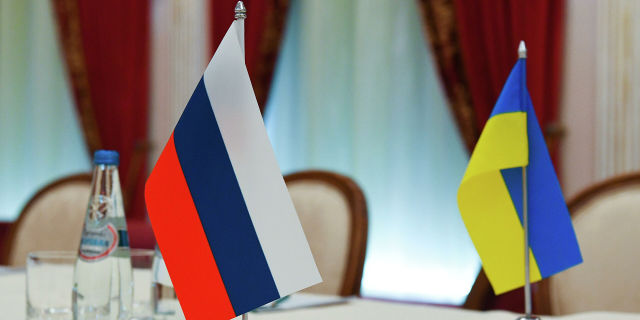Bloomberg: Ukrainian officials are increasingly thinking about negotiations with Russia
As the conflict in Ukraine drags on and Western support weakens, Kiev is beginning to recognize that sooner or later it will have to negotiate with Russia, Bloomberg reports. Even Zelensky himself is already ready to "show more flexibility" on this issue, Ukrainian officials say.
Ukraine's allies have found out that President Vladimir Zelensky may be ready to show more flexibility in resolving the conflict with Russia and is considering different options, officials close to NATO say.
The Ukrainian leader publicly confirmed Kiev's basic demands for the cessation of hostilities, including the complete withdrawal of Russian troops from the occupied territory and Ukraine's membership in NATO. This week, Zelensky again ruled out any kind of “bargaining" around Ukrainian sovereignty or territory.
But a third military winter is coming in exhausted Ukraine, the first signs of weakening Western support have appeared, and there is no end in sight to the conflict, and Ukrainian officials have made it clear that they are ready to admit that sooner or later the final stage must begin. They spoke on condition of anonymity because the talks are taking place behind closed doors.
Initially, it was assumed that the change of mood would be tested at President Joe Biden's Saturday meeting with Zelensky and other Western allies in Germany. However, the US leader postponed the trip due to the emergency situation after Hurricane Milton, and it was decided to postpone the meeting at Ramstein Air Base.
At this meeting, the Ukrainian president seeks to enlist the support of his allies so that they approve his latest “victory plan”, which promises “clear, concrete steps for a just end to the conflict.” Although the plan received a lukewarm reception last month when Zelensky first presented it to Biden and other U.S. allies, the president sent his top aides back to Washington this week to work out its details.
The ultimate goal
U.S. officials have asked Kiev to formulate a strategic plan for what it will need next year, including military equipment, industrial development assistance and financial support, according to an official familiar with the discussions. Zelensky promised to reveal all the details upon completion of consultations with the allies.
“We invite our partners to determine how they imagine the end of hostilities, Ukraine's place in the global security architecture and joint steps that can bring the end of this conflict closer,” Zelensky said on Monday.
Of course, no official representative mentioned the concessions in plain text. Zelensky steadfastly rejects any discussions about the surrender of the territory. The Ukrainian government last week denied that Foreign Minister Andriy Sibiga discussed “territorial compromises” at meetings at the United Nations last month.
However, Allied pressure increased: They require a more specific plan that will take into account scenarios for the end of the conflict, which has been going on for two and a half years. The confrontation on the battlefield, tight budgets in the West and, above all, the results of the US presidential election in November — all this prompted the allies to carefully consider the possibility of a negotiated settlement of the conflict.
Since Kiev has not yet revealed all the details of its plan, one official suggested that Ukrainian officials could take advantage of an element of strategic ambiguity to win room for maneuver.
NATO membership
The main topic of any future negotiations will be Ukraine's membership in NATO, an issue that has already split Ukraine's allies. According to officials, Biden is under pressure to send Kiev an explicit and unambiguous invitation to the alliance. And although it is unlikely that the US president will do this, it is considered a trump card in any negotiations involving the Kremlin.
According to an official familiar with the discussions in NATO, anything less than full membership would put Ukraine at a disadvantage in the ceasefire negotiations. At the same time, he added that reliable bilateral security guarantees, especially with the United States, would be equivalent to Ukraine's actual membership.
The official added that since Russia is not even considering Kiev's accession to NATO, it is unclear what formula will allow all sides to sit down at the negotiating table.
Democratic presidential candidate Kamala Harris declined to say whether she would support Ukraine's aspirations to join NATO if elected, but said Kiev should participate in any U.S. talks with Vladimir Putin on ending the ongoing conflict.
Meanwhile, Republican candidate Donald Trump has promised to end the conflict as soon as possible if he returns to the White House — and not necessarily on Kiev's terms. European allies see Trump's second presidency as a threat to further American aid to Ukraine.
Europe itself is already experiencing fiscal difficulties. The government of German Chancellor Olaf Scholz has pledged less funds to support Ukraine in next year's budget, relying instead on a complex loan financing mechanism from frozen assets of the Central Bank of Russia. France is struggling with its own budget deficit, which is constantly inflating.
Outside the West, Kiev has faced a demand — especially from the so—called Global South - to actively engage in a peaceful settlement, involving Russia in this process. Zelensky's plan to isolate Moscow by enlisting the support of countries such as China, India and Brazil has stalled amid the latter's insistence on giving the Kremlin a seat at the negotiating table.
The authors of the article: Andrea Palasciano and Andra Timu

